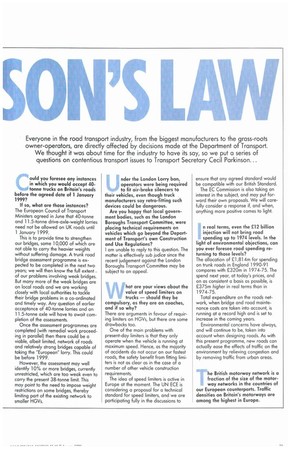ould you foresee any instances in which you would accept
Page 61

If you've noticed an error in this article please click here to report it so we can fix it.
40tonne trucks on Britain's roads before the agreed date of 1 January 1999?
If so, what are those instances? The European Council of Transport Ministers agreed in June that 40-tonne and 11.5-tonne drive-axle-weight lorries need not be allowed on UK roads until 1 January 1999.
This is to provide time to strengthen our bridges, some 10,000 of which are not able to carry the heavier weights without suffering damage. A trunk road bridge assessment programme is expected to be completed in the next two years; we will then know the full extent. of our problems involving weak bridges. But many more of the weak bridges are on local roads and we are working closely with local authorities to tackle their bridge problems in a co-ordinated and timely way. Any question of earlier acceptance of 40-tonne lorries and an 11.5-tonne axle will have to await completion of the assessments.
Once the assessment programmes are completed (with remedial work proceeding in parallel} then there could be a viable, albeit limited, network of roads and relatively strong bridges capable of taking the "European" lorry. This could be before 1999.
However, the assessment may well identify 10% or more bridges, currently unrestricted, which are too weak even to carry the present 38-tonne limit. This may point to the need to impose weight restrictions on some bridges, thereby limiting part of the existing network to smaller HGVs. nder the London Lorry ban, operators were being required to fit air-brake silencers to their vehicles, even though truck manufacturers say retro-fitting such devices could be dangerous.
Are you happy that local government bodies, such as the London Boroughs Transport Committee, were placing technical requirements on vehicles which go beyond the Department of Transport's own Construction and Use Regulations?
I am unable to reply to this question. The matter is effectively sub iudice since the recent judgement against the London Boroughs Transport Committee may be subject to an appeal.
hat are your views about the value of speed limiters on trucks — should they be compulsory, as they are on coaches, and if so why?
There are arguments in favour of requiring limiters on HGVs, but there are some drawbacks too.
One of the main problems with present-day limiters is that they only operate when the vehicle is running at maximum speed. Hence, as the majority of accidents do not occur on our fastest roads, the safety benefit from fitting limiters is not as clear as in the case of a number of other vehicle construction requirements.
The idea of speed limiters is active in Europe at the moment. The UN [CE is considering a proposal for a technical standard for speed limiters, and we are participating fully in the discussions to ensure that any agreed standard would be compatible with our British Standard.
The EC Commission is also taking an interest in the subject, and may put forward their own proposals. We will carefully consider a response if, and when, anything more positive comes to light.












































































































